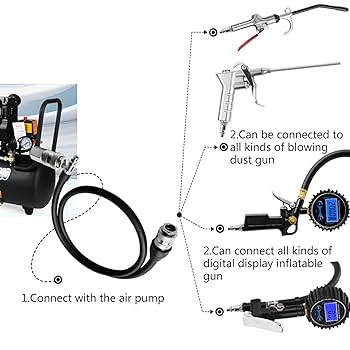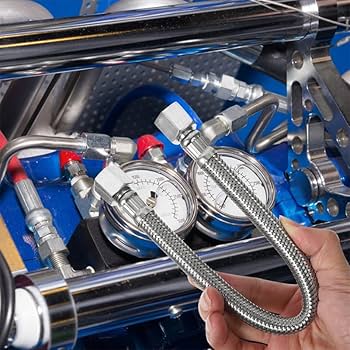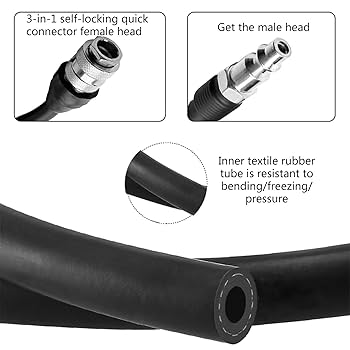If you rely on your air compressor for projects around your home or workplace, you know how important every part is—especially the hose. A worn-out or damaged hose can slow you down, cause leaks, or even create safety risks.
That’s why finding the right replacement hose for your air compressor matters. You’ll discover how to choose a hose that fits perfectly, works reliably, and keeps your tools running smoothly. Keep reading to make sure your air compressor is always ready to deliver the power you need.

Credit: www.amazon.ca
Choosing The Right Hose Material
Choosing the right hose material is important for air compressor performance. The hose must handle pressure and last long. Different materials offer different strengths and weaknesses. Picking the right one helps avoid leaks and damage. It also improves safety and efficiency.
Rubber Vs Pvc Hoses
Rubber hoses are flexible and strong. They resist heat and wear well. These hoses handle rough use on job sites. Rubber stays soft in cold weather. It offers better resistance to kinks and cracks.
PVC hoses are lighter and cheaper. They work well for light tasks and indoor use. PVC is less flexible and can crack in cold. It does not handle heat as well as rubber. PVC hoses are easier to clean.
Benefits Of Hybrid Materials
Hybrid hoses combine rubber and PVC benefits. They are flexible, strong, and lightweight. These hoses resist wear and weather better. Hybrids often last longer than single-material hoses. They offer good performance for many tasks.
Using hybrid hoses can reduce hose damage. They provide better safety with less chance of bursting. These hoses fit many air compressor needs well. They balance cost, durability, and ease of use.

Credit: www.amazon.ca
Key Features For Durability
Durability is essential for any replacement hose used with air compressors. A durable hose lasts longer and reduces the need for frequent replacements. It also ensures safe and steady airflow during use. Key features like wear resistance, temperature tolerance, and pressure ratings determine a hose’s durability. Understanding these features helps you pick a hose that meets your needs and stands up to tough conditions.
Wear Resistance
Wear resistance means the hose can handle rubbing and friction without damage. Hoses with strong outer layers resist cuts, cracks, and abrasions. This protects the hose from daily wear and tear. A hose with good wear resistance stays reliable over time. It also prevents leaks and bursts that cause downtime.
Temperature Tolerance
Temperature tolerance shows how well the hose handles hot or cold air. Air compressors often produce heat during use. The hose must withstand these high temperatures without melting or softening. It also needs to stay flexible in cold weather. A hose with wide temperature tolerance works well in many environments.
Pressure Ratings
Pressure ratings tell the maximum air pressure the hose can safely hold. Using a hose with the correct pressure rating avoids bursts and accidents. High-quality hoses have clear pressure ratings printed on them. Always choose a hose with a pressure rating that matches or exceeds your compressor’s output. This ensures safe and smooth operation.
Flexibility Factors
The flexibility of a replacement hose for an air compressor affects its ease of use and durability. A flexible hose moves smoothly and fits into tight spaces. This helps you work faster and avoid damage. Understanding the factors that influence flexibility makes choosing the right hose easier.
Bend Radius Importance
Bend radius is the smallest curve a hose can make without kinking. A small bend radius means the hose can bend sharply without damage. This is crucial in tight work areas. A hose with a large bend radius may kink or crack, cutting air flow and shortening hose life.
Lightweight Designs
Lightweight hoses reduce hand and arm fatigue during long jobs. They are easier to carry and control. These hoses often use advanced materials like nylon or hybrid polymers. Lightweight designs help maintain flexibility without losing strength or durability.
Storage And Handling Tips
Store hoses coiled loosely to avoid permanent bends. Avoid sharp folds or tight loops that damage the hose walls. Hang hoses or use a reel to keep them off the ground. Clean the hose regularly to prevent dirt buildup that stiffens it. Proper storage and handling keep the hose flexible and extend its lifespan.
Affordable Options Without Sacrificing Quality
Finding a replacement hose for your air compressor does not mean spending a lot. Affordable options exist that still offer strong performance and durability. Quality does not have to be expensive. Many brands focus on delivering reliable hoses at a fair price.
Choosing the right hose means balancing cost with long-lasting use. A budget-friendly hose can handle pressure and wear well. This helps avoid frequent replacements and saves money over time.
Budget-friendly Brands
Several brands provide good quality hoses without high prices. These brands use materials that resist cracks and leaks. Their hoses work well for home and light professional use. Brands like Flexzilla, Goodyear, and Campbell Hausfeld offer solid options. They often come with positive reviews from users who value value and durability.
Where To Buy
Replacement hoses are easy to find online and in stores. Retailers like Home Depot, Lowe’s, and Amazon stock many choices. Online shops often have customer ratings to guide decisions. Buying from a trusted store ensures product quality. Some local hardware stores also carry affordable hoses. Checking prices in several places helps find the best deal.
Warranty And Support
Many affordable hoses come with a warranty to protect buyers. Warranties cover defects and early wear issues. This gives peace of mind when buying a low-cost hose. Good customer support helps with questions and replacements. Choose brands that offer clear warranty terms and responsive service. This adds value beyond just the price tag.
Maintaining Your Air Compressor Hose
Maintaining your air compressor hose keeps it working well and lasting longer. A well-kept hose prevents leaks and safety problems. Simple care steps help you avoid costly repairs and downtime. Regular checks and cleaning improve performance. Safe use protects the hose from damage. Small efforts make a big difference in hose life.
Regular Inspections
Check your hose often for cracks or cuts. Look for signs of wear or soft spots. Inspect connections for tightness and leaks. Replace damaged hoses right away. Early detection stops bigger problems. Visual checks take only a few minutes.
Cleaning Techniques
Clean your hose to remove dirt and debris. Use a damp cloth to wipe the outside. Avoid harsh chemicals that can damage the material. Flush the inside with clean water if needed. Dry the hose completely before storing. Clean hoses work better and last longer.
Safe Usage Practices
Do not twist or bend the hose sharply. Avoid pulling the hose around corners. Store the hose in a cool, dry place. Keep it away from sharp objects and heat. Use the correct hose size for your compressor. Proper use reduces wear and prevents leaks.

Credit: www.amazon.ca
Frequently Asked Questions
What Is The Best Replacement Hose For Air Compressors?
The best replacement hose is durable, flexible, and rated for your compressor’s PSI. Look for materials like rubber or polyurethane for longevity and resistance to kinks.
How Do I Choose The Right Size Replacement Hose?
Choose a hose with the correct diameter and length for your air tools. Ensure it matches your compressor’s output and the working environment to avoid pressure loss.
How Often Should I Replace My Air Compressor Hose?
Replace your hose if you see cracks, leaks, or wear. Regular inspection every 6-12 months helps maintain safety and performance.
Can I Use Any Hose As An Air Compressor Replacement?
No, use hoses specifically designed for air compressors. They handle high pressure and prevent safety hazards compared to general-purpose hoses.
Conclusion
Choosing the right replacement hose keeps your air compressor working well. A good hose lasts longer and handles pressure safely. Check the size, material, and fittings before buying. Regularly inspect the hose for cracks or leaks. Replace it quickly if you find any damage.
This helps avoid accidents and keeps your tools running smoothly. A proper hose saves time and effort during projects. Keep your air compressor ready for any job with the right hose. Simple steps make a big difference in performance and safety.

